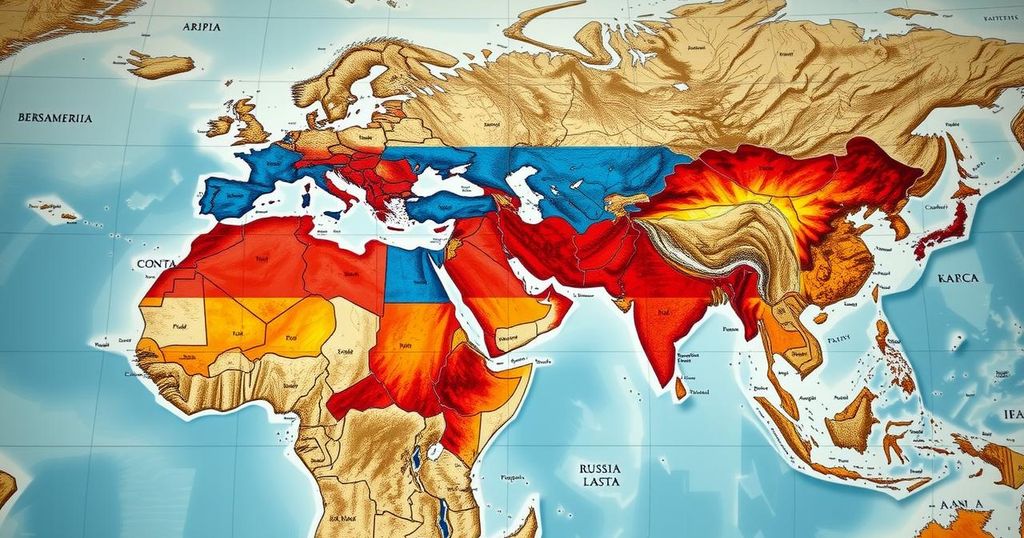Assessing Russia’s Diminishing Influence as a Great Power in Africa
Russia’s ultimate goal of asserting itself as a great power in Africa is unraveling due to military overstretch, increased violence, rising civilian dissatisfaction, and loss of strategic footholds in various countries, including Mali. This diminishing influence is further exacerbated by the fallout of its Ukraine conflict and ineffective economic engagement, leading to a crisis of credibility in the Kremlin’s narrative of support for African nations.
Russia’s aspirations as a formidable power in Africa have been increasingly challenged by its overstretched military resources and a lack of effective engagement strategies. The aftermath of heavy Russian casualties in Mali, attributed to Islamist groups, highlights the Kremlin’s struggles on the continent. Despite portraying itself as a supporter of African sovereignty, Russia’s involvement is largely driven by self-interest, focusing on securing mining deals in exchange for military support that has often resulted in increased violence and instability for local populations.
With operations across various countries, including Mali, Burkina Faso, Niger, and the Central African Republic, the situation on the ground has deteriorated for civilians amid rising death tolls. Russia’s significant military commitments in Ukraine have limited its capacity to respond effectively to emerging situations in Africa. Furthermore, recent developments in Mali, including the Malian government’s drive to diversify its security partnerships, suggest a waning influence of Russian forces.
Moscow’s reliance on private military contractors like the Wagner Group has come under scrutiny, as reports of human rights abuses, including massacres and systematic sexual violence, surface. Recent military setbacks, coupled with internal challenges following the turmoil surrounding the Prigozhin insurrection, have prompted the Malian authorities to reconsider their formidable alliance with Russia. Turkey appears to be capitalizing on this shift by providing military training and support to the Malian forces.
Amidst these geopolitical maneuvers, Russia’s inability to offer significant humanitarian aid or economic investment underscores its limited influence. Trade volumes between Russia and Africa remain modest compared to those of Western nations. Additionally, deceptive narratives and propaganda tactics utilized by Russia are increasingly under threat as African nations reassess their foreign partnerships in light of changing regional dynamics. The overarching reality is that Russia’s strategy is unraveling, revealing a fragile influence sustained by a tenuous narrative rather than substantive capability.
In summary, while Russia has attempted to position itself as a key player in Africa, its overextension, coupled with the unsatisfactory outcomes of its interventions, has revealed significant vulnerabilities. The perception of Russian power is increasingly challenged by the realities on the ground, leaving its aspirations as a great power in Africa severely undercut.
Russia’s historical involvement in Africa primarily stemmed from its support for anti-colonial movements during the Cold War. However, post-Soviet Russia’s strategy has pivoted towards securing economic interests, particularly in the mining sector, where deals often involve military support for local regimes. The exigencies of the recent conflict in Ukraine have further complicated Russia’s ability to project power abroad, revealing limits to its military efficacy in countries where it has sought to extend influence. The growing dissatisfaction among African regimes and their populations towards Russian mercenaries has emerged alongside the realization of unmet expectations regarding security and stability.
In conclusion, Russia’s ambitions of establishing itself as a great power in Africa are increasingly hampered by practical limitations in military capacity, dwindling public support due to human rights abuses, and a lack of meaningful economic engagement. As African states reconsider their alliances and seek practical solutions to security challenges, Russia’s role may significantly diminish. The combination of these factors suggests that Moscow’s narrative of power is frail and unsustainable, underpinned more by propaganda than by actual influence or capability.
Original Source: foreignpolicy.com




Post Comment